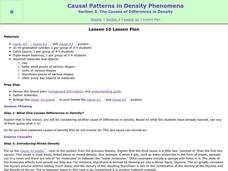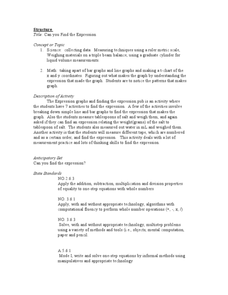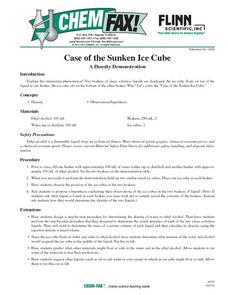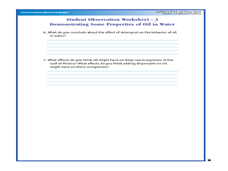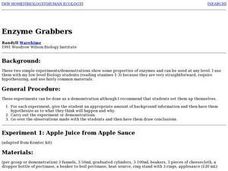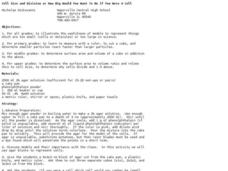Curated OER
Density Lab Activities
Pupils participate in several density lab activities in order to clarify the misconceptions that solids sink and liquids float. Students work with triple beam balances to find mass of objects to calculate density.
Alabama Learning Exchange
Sky High
How are skyscrapers built? What does it take to make a structurally sound building? How can one work within a budget to complete a building project? These guiding questions will be investigated and answered within a hands-on lesson....
Curated OER
As a Matter of Fact!
Students explore matter. They use a formula to measure the volume of matter.
Curated OER
Physical Changes and States of Matter
Fourth graders study evaporation and condensation as parts of the water cycle. First they determine the similarities and differences between a cup of water and an ice cube before measuring the volume of ice before melting it, and...
Baylor College
We Need Water
There's nothing quite like a glass of ice-cold, freshly squeezed lemonade. Lesson seven of this series explains how the water humans need to survive can come in many forms. Teach your class about how much water humans require every day...
Curated OER
Metric Mania
Pupils observe how to measure in metric units. In this investigative lesson students compare different units of volume to see how things are measured.
Curated OER
Physical Changes and States of Matter
Fourth graders identify a physical change as one that results in a change in size, shape, or state of matter. After an initial teacher-led discussion and demonstration, groups of students get together to perform an experiment which...
Virginia Department of Education
The Particle Theory of Matter
Demonstrate the particle theory of matter to high school scientists with an engaging experiment that allows them to visually see the results as substances change from one state to another. The class concludes with a discussion about how...
Curated OER
Chemistry Lab-Heat of Fusion
Students determine the heat of fusion of ice. In this heat of fusion lesson plan, students use a calorimeter to measure the molar heat of fusion of ice. Students determine the heat required to melt one mole of ice using hot water and ice...
Pennsylvania Department of Education
Determine Volume of Solids Using Water Displacement
Students explore math functions by completing math equation worksheets. In this inequality lesson, students define a list of math terms and discuss the difference between an equation and inequality. Students utilize a real life situation...
Curated OER
Chemistry Is a Gas
Students investigate the gas laws and how they apply to changes in gases. In this gas laws lesson plan, students use Boyle's Law and Charles' law to show the relationships between pressure and volume and volume and temperature of gases.
Curated OER
The Relationship Between Salinity and the Density of Water
Students investigate density and salinity of water. In this density and salinity lesson plan, students find the density of objects and liquids and show the relationship between the salinity and density of water. Students add salt to...
Curated OER
The Causes of Differences in Density
Students explore the causes of differences in density. Students choose objects, measure the mass and volume, and calculate the density of each. They perform additional density experiments to model atoms and their correspondence to...
Curated OER
Can you Find the Expression
Students collect data from measurements and weights for this experiment. In this algebra lesson plan, students analyze graphs they create form their data to find the expression representing the data. They label which graph provided the...
Curated OER
Testing Density of Various Soap Products
Students have the opportunity to observe, measure and analyze the density of aerosol shaving creams and foams generated from shampoo and dishwashing liquids or detergents.
Curated OER
Chemistry: The Case of the Sunken Ice Cube
Students examine a density demonstration involving ice cubes and beakers of water and alcohol. After observing how one ice cube floats in water and sinks in alcohol, they determine which mixture of the two would suspend the ice cube in...
Curated OER
DNA Extraction From Onion
Students extract DNA from an onion using household equipment and supplies.
Curated OER
Oil Floats, Right?
Students examine the properties in oil in water. For this mixture lesson, students read about the Lophelia II 2010: Cold Seeps and Deep Reef Expedition and look at images of deep sea ecosystems. They experiment or participate in...
Alabama Learning Exchange
Effects of Friction on a Moving Block
Young scholars investigate how friction affects the movement of a block across surface areas. They test five different kinds of surfaces—smooth surface, wax paper, a paper towel, course, and fine sandpaper. They predict and record the...
Curated OER
Enzyme Grabbers
Students perform two experiments to show the properties of enzymes. They use pectinase to produce apple juice from applesauce to show enzyme action and then taste the difference between raw and boiled papaya seeds as evidence of enzyme...
Curated OER
Models and Algorithms to Solve Multiplication Problems
Students choose the correct strategy to solve multiplication and division. In this algorithm lesson, students use at least two strategies that use properties of operations and estimation. Students also recognize the relationship between...
Curated OER
Density and Buoyancy Lesson Plan
Young scholars investigate why some objects float or sink in water. In this physics lesson, students calculate the density of clay ball using a mathematical equation. They write a complete lab report about the experiment.
Curated OER
Enzyme Grabbers
Students perform simple experiments to show properties of enzymes through studying how apple sauce can turn into apple juice and experimenting with papaya seeds. Students witness how enzymes speed up reactions through witnessing the...
Curated OER
Cell Size and Division or How Big Would You Want To Be if You Were a Cell?
Students investigate why cells divide. In this cell size lesson plan, students observe how far a solution travels into 3 different size model cells of agar. They answer questions about the most effect movement of "nutrients" into the...












